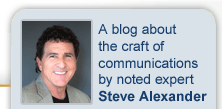Why do we let email get the best of us?
Just did another senior management training last week and the topic always comes up – what about email? How do we manage it, use it, control it, keep from getting buried by it and fix communications that get broken by it… the list of questions, comments and consternation goes on and on. The 29 August 2010 Sunday column, Corner Office by Adam Bryant, includes a comment about email (along with a number of other key insights Bryant’s weekly column provides) from Kasper Rorsted, the CEO at Henkel, a consumer and industrial products company, so I thought it was time to underscore some tips from an earlier post and make a point about email and the importance of face-to-face communications.
Email is NOT dialogue! It is not a substitute for honest, open, transparent communication. Email is two-way monologue, where one person gets to make their point, state their case, convey information, thoughts, feelings or whatever, without the benefit of the other person being present. Email is NOT a short-cut for communication. It is a form of communication, however, designed for one-way transmittal.
Remember: There is no substitute for direct, face-to-face communication, especially when an issue warrants it. For example, anything that affects your organization’s mission, vision, values, goals and deals with major strategies, decisions or compromises them requires direct, real-time communication. Personnel issues, challenges and coaching opportunities – set a meeting. Major problems with a product or service – set a meeting. Customer/member/client complaints – set a meeting.
Don’t let email get the best of you. It’s your job to manage it, rather than it managing you. Use it wisely as a tool for information transfer, not as a comprehensive communications program. There’s no substitute for getting up from your desk and making contact, or setting up time to communicate, face-to-face, with people! Use your email wisely so it’s not being misused by you or others.
P.S. Try adopting Henkel CEO Rorsted’s tip on deleting ALL email where you are only in the cc line. His point: being in the copy line is often only for someone’s ‘cover’ and if they want to connect with you, those emails should be To: you. Try it for a couple weeks and let me know if your email flow is more manageable, and if it helps make your communications more productive, valuable and meaningful.




